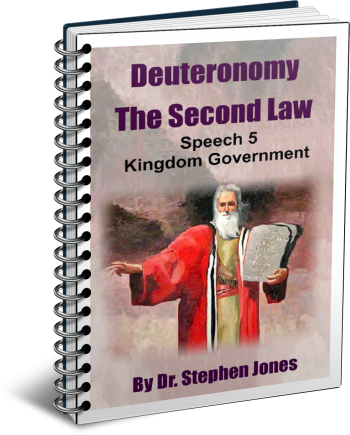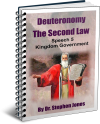Latest Posts
View the latest posts in an easy-to-read list format, with filtering options.

A commentary on the fifth speech of Moses in Deuteronomy 16-21. The book of Deuteronomy is a series of 12 speeches that Moses gave just before his death at the end of Israel's wilderness journey.
Category - Bible Commentaries

We have now finished the 19th chapter of Deuteronomy, where Moses spent considerable time speaking about the laws of murder and homicide. Chapter 20 deals with the laws of war, and then chapter 21 continues with the subject of unsolved murder. Ferrar Fenton believed that chapter 20 is out of order in the text as we have received it, and so his translation puts Deut. 21:1-9 immediately after chapter 19, followed by chapter 20. His reasons are stated in his notes as follows:
“I had always felt that the accepted order of the matter had been confused by some very ancient transcribers, and therefore consulted scholars whom I believed to be fully competent to assist me in a rectification, by which I proposed to bring the thought of the speeches of Moses in those chapters to a perfectly consecutive current of meaning. All agreed with me that the old text had been confused, but would not venture to decide whether my new proposed arrangements were correct.
“I was disappointed, so at last appealed to my talented friend the Reverend John Bowen, B.C., Rector of St. Lawrence, Pembrokeshire, who is an accomplished Classic and Oriental Scholar, and he kindly consented to co-operate with me, and I accepted his exact and careful amendments to my suggestions, feeling convinced that they were right.
“The confusion of the text at the various points noted in my margin, I think, arose at the time when our present text was copied on to a roll of skins, from the original stone plates or tablets upon which Moses engraved the Speeches for record in the Ark of Witnesses, as stated by Aliazer, his Editor, in Ch. xxxi., v. 24, of Deuteronomy. The Scribe then evidently confused the order of the plates. The fact that the various passages implicated contain about the same number of words, I take as an indication that my view is the right one.
“My learned and judicious friend, the Rev. J. Bowen, however, informs me that a previous commentator upon this part of Deuteronomy, who had noted the confusion in the records, has suggested an even earlier period for its origination. He believed, and Mr. Bowen seemed to agree with him, that it was made at the time when, in accordance with the command of Moses, the Law was engraved, “deeply cut,” upon the pillars set up, and covered with some enduring chemical plaster, in the Vale of the Jordan, upon the passage of Joshua and his Army. That there the autographic tablets of Moses were in these paragraphs misarranged, and subsequent transcribers failed to rectify the error. I leave my readers to decide which theory has the best weight of evidence to support it.”
In other words, the stone tablets of Deuteronomy were taken out of the Ark in order for transcribers to write the law upon larger stones in the Vale of the Jordan. The stones were cumbersome, and it appears that two of the tablets were reversed. This does not affect the content itself, of course, but only the general flow of Moses’ topic. The text of Moses’ speech on Kingdom Government ought to be read in this order:
Deut. 16:18 to the end of Deut. 19
Deut. 21:1-9 (Laws of Murder, continued)
Deut. 20 (Laws of War)
Deut. 21:10-14 (Laws of War, continued)
Ferrar Fenton treats the laws of war in Deuteronomy 20 as a separate speech (that is, the sixth speech). However, the laws of war should naturally follow the topic of murder and homicide, because it clarifies that war is not murder, when conducted in a godly manner. Further, the topic of war is a integral part of the Sixth Commandment, “You shall not murder,” for without this chapter we might wonder if war itself is a violation of the law, or if killing in time of war is a sin.
Hence, we include the laws of war as part of Moses’ fifth speech, because it completes the topic at hand all in one speech.
Nonetheless, we ought to restore the order of the text as Fenton instructs. So we will skip Deuteronomy 20 for the moment and go directly to chapter 21:1-9, as Fenton does in his translation.